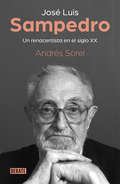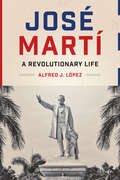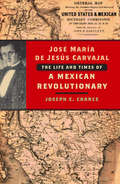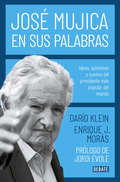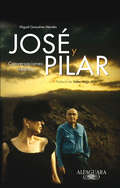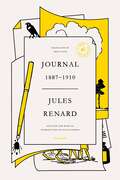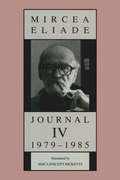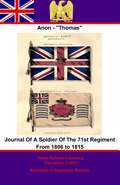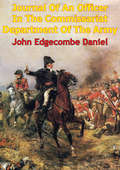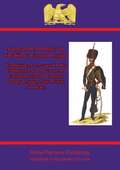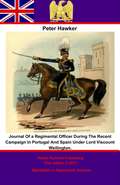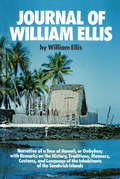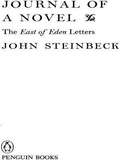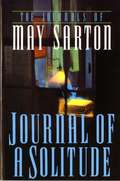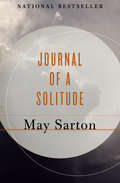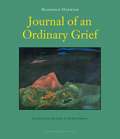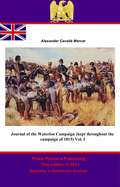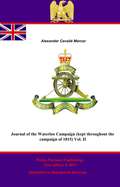- Table View
- List View
José Luis Sampedro. Un renacentista en el siglo XX
by Andrés SorelAndrés Sorel nos descubre este personal retrato de José Luis Sampedro a través de su primera biografía autorizada. 1937. Guerra en España. Un joven oficial de Aduanas destinado en Santander publica una revista y en ella habla de Montaigne. Este es el punto de partida de esta narración. El joven oficial se llamaba José Luis Sampedro y el narrador de esta historia, Andrés Sorel. Sin duda es poco frecuente leer a Montaigne antes de los veinte y asimilarlo hasta el punto de sentir la necesidad de reflexionar sobre el escritor en una revista autoeditada. Este hecho poco conocido y comentado en la biografía de José Luis Sampedro llamó poderosamente la atención de Andrés Sorel, quien, al enterarse de ello setenta años después, miraría con otros ojos al para ya entonces prestigioso economista, docente, escritor, pensador, humanista y referente moral para muchos. En el sexto aniversario del fallecimiento de Sampedro, Sorel rinde homenaje al querido y admirado amigo con estas hermosas reflexiones. Con una escritura profunda, dura, pero a la vez poética, esta particular biografía se convierte en el testimonio de una larga amistad y en un auténtico privilegio para el lector que quiera asomarse a las conversaciones entre dos intelectuales hondamente comprometidos con sus ideas Reseña:«Lo que caracteriza a Andrés Sorel es su calidad como escritor.»Luis María Anson, de la Real Academia Española
José Martí: A Revolutionary Life (Joe R. and Teresa Lozano Long Series in Latin American and Latino Art and Culture) (Joe R. and Teresa Lozano Long Series in Latin American and Latino Art and Culture)
by Alfred J. López&“The one and only book that treats the nineteenth-century Cuban figure José Martí as a human instead of an idol, an apostle, or an unblemished personality.&” —Tom Miller, author of Revenge of the Saguaro José Martí (1853–1895) was the founding hero of Cuban independence. In all of modern Latin American history, arguably only the &“Great Liberator&” Simón Bolívar rivals Martí in stature and legacy. Today he is revered by both the Castro regime and the Cuban exile community, whose shared veneration of the &“apostle&” of freedom has led to his virtual apotheosis as a national saint. In José Martí: A Revolutionary Life, Alfred J. López presents the definitive biography of the Cuban patriot and martyr. Writing from a nonpartisan perspective and drawing on years of research using original Cuban and U.S. sources, including materials never before used in a Martí biography, López strips away generations of mythmaking and portrays Martí as Cuba&’s greatest founding father and one of Latin America&’s literary and political giants, without suppressing his public missteps and personal flaws. In a lively account that engrosses like a novel, López traces the full arc of Martí&’s eventful life, from his childhood and adolescence in Cuba, to his first exile and subsequent life in Spain, Mexico City, and Guatemala, through his mature revolutionary period in New York City and much-mythologized death in Cuba on the battlefield at Dos Ríos. The first major biography of Martí in over half a century and the first ever in English, José Martí is the most substantial examination of Martí&’s life and work ever published. &“The life, the history and the facts are all here in López&’s volume.&” —The Washington Post
José Martí: A Revolutionary Life (Joe R. and Teresa Lozano Long Series in Latin American and Latino Art and Culture) (Joe R. and Teresa Lozano Long Series in Latin American and Latino Art and Culture)
by Alfred J. López&“The one and only book that treats the nineteenth-century Cuban figure José Martí as a human instead of an idol, an apostle, or an unblemished personality.&” —Tom Miller, author of Revenge of the Saguaro José Martí (1853–1895) was the founding hero of Cuban independence. In all of modern Latin American history, arguably only the &“Great Liberator&” Simón Bolívar rivals Martí in stature and legacy. Today he is revered by both the Castro regime and the Cuban exile community, whose shared veneration of the &“apostle&” of freedom has led to his virtual apotheosis as a national saint. In José Martí: A Revolutionary Life, Alfred J. López presents the definitive biography of the Cuban patriot and martyr. Writing from a nonpartisan perspective and drawing on years of research using original Cuban and U.S. sources, including materials never before used in a Martí biography, López strips away generations of mythmaking and portrays Martí as Cuba&’s greatest founding father and one of Latin America&’s literary and political giants, without suppressing his public missteps and personal flaws. In a lively account that engrosses like a novel, López traces the full arc of Martí&’s eventful life, from his childhood and adolescence in Cuba, to his first exile and subsequent life in Spain, Mexico City, and Guatemala, through his mature revolutionary period in New York City and much-mythologized death in Cuba on the battlefield at Dos Ríos. The first major biography of Martí in over half a century and the first ever in English, José Martí is the most substantial examination of Martí&’s life and work ever published. &“The life, the history and the facts are all here in López&’s volume.&” —The Washington Post
José María Ruiz. Si no lo soñé
by José María RuizDescubre todos los secretos de José María Ruiz, la estrella de La Voz Kids que ha conquistado el corazón de miles de fans, en su libro 100% oficial repleto de fotografías y contenido inédito. «Nunca sabes lo que va a pasar, eso está claro. Si alguien me hubiera dicho que podría ganarme la vida haciendo lo que más me gusta, creo que me habría entrado la risa nerviosa. Y sin embargo, aunque parezca un sueño, se ha cumplido. Y todavía ahora muchas veces cuando me veo en la tele no me reconozco, yo no soy ese José María delante de los focos. Yo soy yo... un chaval normal, con sus amigos, su familia, sus miedos y sus comidas de cabeza... así que no voy a contarte nada que no sepas, pero sería genial compartir este sueño contigo. ¿Te vienes?»José María Ruiz Nervioso, sentimental y con una voz que quita la respiración. Así es como la mayoría de sus fans conoce a José María Ruiz, pero detrás de esa imagen tímida y sensible, José María Ruiz esconde todo un mundo. En este diario repleto de fotografías inéditas y notas manuscritas por el autor, el cantante nos abre la puerta a sus pensamientos más íntimos, a sus secretos y a las experiencias más locas e increíbles que ha vivido desde que ganó La Voz Kids.
José María de Jesús Carvajal
by Joseph E. ChanceBoth a biography of the titular Mexican reformer and a study of the events that shaped the Mexican-U.S. border, this book examines the challenges faced by Carvajal during the turbulent decades of the early to mid-19th century. A key figure in the violent struggle against the conservative factions that controlled Mexico, Carvajal also played significant roles in the fight for Texas's independence and the ill-fated Republic of the Rio Grande. Carvajal's life and exploits have been largely overlooked - here, he is restored to his rightful place among the visionaries who shaped modern Texas.
José María de Jesús Carvajal
by Joseph E. ChanceBoth a biography of the titular Mexican reformer and a study of the events that shaped the Mexican-U.S. border, this book examines the challenges faced by Carvajal during the turbulent decades of the early to mid-19th century. A key figure in the violent struggle against the conservative factions that controlled Mexico, Carvajal also played significant roles in the fight for Texas's independence and the ill-fated Republic of the Rio Grande. Carvajal's life and exploits have been largely overlooked - here, he is restored to his rightful place among the visionaries who shaped modern Texas.
José María de Jesús Carvajal
by Joseph E. ChanceBoth a biography of the titular Mexican reformer and a study of the events that shaped the Mexican-U.S. border, this book examines the challenges faced by Carvajal during the turbulent decades of the early to mid-19th century. A key figure in the violent struggle against the conservative factions that controlled Mexico, Carvajal also played significant roles in the fight for Texas's independence and the ill-fated Republic of the Rio Grande. Carvajal's life and exploits have been largely overlooked - here, he is restored to his rightful place among the visionaries who shaped modern Texas.
José Mujica en sus palabras: Ideas, opiniones y sueños del presidente más popular del mundo
by Darío KleinUn íntimo retrato del más célebre uruguayo de todos los tiempos. José Mujica es una personalidad reconocida y apreciada en el mundo entero. El profundo sentido de su mensaje ha calado hondo en miles de personas y lo ha convertido en uno de los referentes ineludibles de nuestro tiempo. Este libro refleja el recorrido vital del expresidente uruguayo, marcado profundamente por su largo encarcelamiento y tortura, durante los que cultivó su pensamiento y sus ideas y, en definitiva, la filosofía de vida que ahora queda capturada en estas páginas. El texto se nutre de múltiples fuentes, la mayoría entrevistas, discursos y presentaciones, e incluye una gran cantidad de contenidos exclusivos que el tupamaro ha confiado a los autores en extensas entrevistas personales. El resultado es este íntimo retrato de uno de los gobernantes más admirados de nuestro tiempo.
José Reyes (Superstars of Baseball)
by Tania RodriguezJosé Reyes has become one of baseball's biggest stars. He has led the National League in stolen bases and batting average. He has played in the All-Star Game, won awards, and made millions of dollars. His time in the Major Leagues has been a dream-come-true for the Dominican player. Learn about the life of one of baseball's newest stars. Read how he worked his way through the minor leagues to play for the New York Mets. Discover the story of one of baseball's superstars!
José Valverde (Superstars of Baseball)
by Tania RodriguezToday, José Valverde is one of baseball's best relief pitchers. Valverde has pitched in the All-Star game. He's won awards and made millions of dollars. Valverde even had a perfect regular season in 2011! Valverde's path to finding success in the MLB was a long one, though. He had to work hard to make it to where he is today. Read how Valverde started playing baseball thanks to his uncle, former MLB pitcher José Mercedes. Learn about Valverde's success in the minor leagues and find out how he became one of baseball's best pitchers.
José y Pilar: Conversaciones inéditas
by Miguel Gonçalves MendesUn encuentro con el mundo íntimo del gran escritor portugués José Saramago. Durante cuatro años, Miguel Gonçalves Mendes filmó a José Saramago y Pilar del Río en su intimidad de Lanzarote, a lo largo de sus viajes por todo el mundo, en fiestas con amigos y familia. De esa intensa grabación resultaron, primero, la película José y Pilar, y ahora un libro compuesto, esencialmente, de material inédito: horas de conversaciones que exploran grandes cuestiones como la política, el amor, el trabajo, la literatura o la muerte. «La grandeza de Saramago no tiene adjetivos que la definan fielmente, y los que existen se quedan cortos. Tampoco hay palabras para definir con justicia esa sociedad que José y Pilar forman.»Luis Sepúlveda «Me siento orgulloso y agradecido de que ambos me permitieran entrar en sus vidas y compartir momentos inolvidables, donde el dolor, a un ritmo lento e inexorable, se aproximaba, pero el entusiasmo por cambiar las cosas y por luchar estuvieron presentes hasta el final. José Saramago estará allí donde lo necesitemos; sus pensamientos, sus ideas, su vida, su amistad, siempre nos acompañarán. Y Pilar, su traductora, su amiga, su amante, su esposa, su musa, a quien dedicó todas sus obras desde que la conoció, será su legítima representante y continuará con su lucha.»Baltasar Garzón «Observé la manera en la que se dirigía a la gente, sin diferenciar entre la señora que pone el plato en la mesa o el pez gordo condecorado que se sienta bien orgulloso a su lado. Creo que era mi abuela quien decía que la gente ofrece su mejor sonrisa a los suyos y mala cara a los demás. Y en cierto modo, [para Saramago] todos eran de los suyos. Ese toque popular que otorga el nacer entre los más sencillos impide siempre desligarse de la percepción de la diferencia, del desajuste social, y otorga una humildad enorme.»Valter Hugo Mãe
Journal 1887–1910
by Jules RenardA wry, observant masterpiece—one of the singular treasures of the French fin de siècleWritten between the age of twenty-three and his death at age forty-six, Jules Renard’s Journal 1887–1910 is a triumph of introspection and wit. One of the most celebrated figures of Belle Époque Paris, Renard was also a prolific diarist whose private musings were first published in five volumes some fifteen years after his death. Acclaimed by everyone from Somerset Maugham to Samuel Beckett to Susan Sontag, the Journal has had a decisive influence on contemporary letters and was named one of the 100 Books of the Century by Le Monde. It is also a singularly funny work, full of aphorisms, jokes, and sly observations on some of literature’s most indelible characters.These selections, brought together by Julian Barnes and translated by Theo Cuffe, offer unparalleled and unfailingly entertaining glimpses of a bygone world. Moving from modish Parisian salons to the French countryside, where Renard served as a provincial mayor in the final years of his life, the Journal is a portrait of a society in flux and a playground for one of the era’s great prose styles. Here, Renard confirms his place among France’s most dazzlingly inventive writers.
Journal IV: 1979–1985
by Mircea EliadeJournal IV is the first publication, in a translation from the Romanian manuscript, of the journal that Mircea Eliade kept during the last seven years of his life. In this period, Eliade is ensconced as a famous scholar—his works are being translated into many languages and books about him arrive regularly in the mail. His encounters with scholars of like repute are recorded in the journal; after a party in Paris, Eliade shares a taxi with Claude Lévi-Strauss and inadvertently makes off with his raincoat. Running like a fault line through the peak of his success, however, is Eliade's painful awareness of his physical decline—failing vision, arthritic hands, and continual fatigue. Again and again he repeats how little time he has to finish the projects he is working on—his autobiography, the third and fourth volumes of his History of Religious Ideas, and the duties associated with his editorship of the Encyclopedia of Religion. He poignantly recounts the sharpest blow: the disorganization and eventual destruction by fire of his personal library. Within the scope of Journal IV Eliade and his world go to ruin. What does not decline is the vivid and persistent voice of Eliade the writer, an unbreaking voice that—with death only months away—plans a reply to critics, plots out an article, and ruminates on characters to people another novella.
Journal Of A Soldier Of The 71st Regiment From 1806 to 1815
by Pickle Partners Publishing Anon Thomas"This ebook is purpose built and is proof-read and re-type set from the original to provide an outstanding experience of reflowing text for an ebook reader. This work is the journal of an anonymous soldier from Edinburgh, known only as Thomas, having enlisted as a short term soldier for seven years in 1806. He was not motivated by any thought of gaining glory in the wars against France; his motive for enlisting was his lost honour and the shame of having wronged his parents following a failed attempt at a stage career. He was an educated man and wrote very well, but, haunted by the dishonour of his actions, he took the King's shilling from the first recruiting sergeant that was passing. Unknown to him this regiment was the 71st, later Highland Light Infantry, a regiment of great renown and élan that had and would be in the forefront of the fighting. Thomas saw his redemption in a journey through the purgatory of service as a private soldier in the British army. His travails would be hard and the privations many but bound by his word he sticks to his resolution. He was to campaign far and wide: from the expedition to Buenos Ayres, during which he was captured, to the despicable conditions of the retreat to Coruña, fever-ridden Walcheren, battles and skirmishes in the Peninsula including Roleia, Vimiero, Fuentes D'Oñoro, Vittoria, Bayonne and the Nivelle, and finally the battle of Waterloo. His discharge followed soon after and, despite being back in his homeland of Scotland, the penury of an ex-serviceman was his only reward. A vivid and uncompromising tale of hard fighting, privation and the realities of war. Text taken, whole and complete, Constable's Miscellany, Vol. XXVII, Memorials of the Late War Vol. I. published Constable & Co, Edinburgh 1828. Original -119 pages Author - Anon- (1790-????) There are no chapters, hence no TOC
Journal Of An Officer In The Commissariat Department Of The Army: Comprising A Narrative Of The Campaigns Under The Duke Of Wellington, In Portugal, Spain, France, And The Netherlands
by John Edgecombe Daniel"A reporter's eye on great historical events"Readers may be of the initial opinion that the view of an officer of the Commissariat Department would be necessarily less dynamic than that of a regimental officer. In fact, Daniel's position as a non-combatant has proved to be the exact opposite and of particular value to those interested in his subject matter by his comparative detachment from the narrow and confused view of the actual battle line. Daniel was able to overview the great events of which he was a participant and leave us essential reports that few were in a position to witness. Actually, Daniel was often close enough to the action as to have comrades killed next to him, so this is far from a view 'from behind the lines.' We follow Daniel on campaign with the 'Great Duke' throughout the Peninsula, over the Pyrenees and into Southern France. When the time comes to bring the Emperor to account at Waterloo, Daniel once again joined Wellington's Army in the field and he has provided another vital insight into the campaign of 1815 to enhance our knowledge of these pivotal events."-Print Edition
Journal Of An Officer In The King's German Legion
by AnonDuring the Napoleonic Wars, many elite units served their respective masters. However, few had such an enduring yet brief history as the King's German Legion. Recruited predominantly from Hanover, which had been invaded by the French in 1803, the men of the Legion would face many tough adventures all over Europe before returning to their homeland again.In this anonymously published memoir, the author recounts his adventures on land and sea, fighting fiercely against the Napoleonic domination of Europe from Denmark to Malta, from the mountains of Portugal to the plains of Spain. The author was present at the capture of Oporto and the battles of Talavera and Fuentes d'Oñoro, and his tales of adventure are described in pacy detail.Author -- AnonText taken, whole and complete, from the edition published in 1827, London, by Henry Colburn.Original Page Count - xxiv and 329 pages.
Journal Of My Life
by Robert Darnton Daniel Roche Jacques-Louis MénétraAn eighteenth-century Frenchman describes life in Paris, the events of the French Revolution, and his own fondness for pranks and jokes.
Journal Of a Regimental Officer During The Recent Campaign In Portugal And Spain Under Lord Viscount Wellington.: With A Correct Plan Of The Battle Of
by Peter HawkerThis ebook is purpose built and is proof-read and re-type set from the original to provide an outstanding experience of reflowing text for an ebook reader. Captain Peter Hawker was a young officer, full of enthusiasm, cultured and with a eye of an artist in his when he started out his service in the Peninsula with the 14th Light Dragoons. Although memoirs of the Peninsula abound, most were written some years after the events described in them, his short reminiscence was written immediately after his return in 1810 and retains the freshness of his memory aided by notes of his journal that he entered at the time. Hawker entered into the fray in late 1808 and joined the Peninsular army just before Wellington took over command, the first part of his journal focuses on the sights and scenery in and around Lisbon as he takes the role of a tourist. He describes the beautiful yet un-healthy city, its churches and the destruction left by the occupying French before he moves with the army northward. He is none too pleased with the towns and villages that he enters filled as they are with vermin, fleas and lice. He and his squadron take part in the forcing passage of the Douro and engage in a successful but reckless charge against an entire brigade. Having ejected Soult and his French divisions in some disarray from Portugal, Hawker and his comrades pass into Spain, he masterfully describes the magnificent scenery, and although the villages are less mean and better kept the civilians are only happy whilst the British army advances. He gives a good account of the battle of Talavera in which he took a full part and was seriously wounded, and is not backward in apportioning blame to some of the Spanish soldiers who ran away without being seriously attacked. After the battle due to some serious miscommunication between Wellington and Cuesta, Hawker is left behind with the wounded and is forced to make his epic journey back to British lines with only his wits and his servant with him, his hip broken and a bullet lodged in his back. Text taken, whole and complete, from the 1810 edition, published by R Johnston, London. Original -137 pages Maps - 1 - Not Included due to its size - A3 Author - Peter Hawker - (1786-1853)
Journal of William Ellis
by William EllisThe Journal of William Ellis is a classic of Pacific literature, ranking with the journals of Captain Cook and his men as a record of life and customs of the traditional Hawaiians. No other book rivals it as an account of the life of the Hawaiians in the early 19th century.
Journal of a Novel: The East of Eden Letters
by John SteinbeckEach working day from January 29 to November 1, 1951, John Steinbeck warmed up to the work of writing East of Eden with a letter to the late Pascal Covici, his friend and editor at The Viking Press. It was his way, he said, of "getting my mental arm in shape to pitch a good game. " Steinbeck's letters were written on the left-hand pages of a notebook in which the facing pages would be filled with the test of East of Eden. They touched on many subjects--story arguments, trial flights of worknamship, concern for his sons. Part autobiography, part writer's workshop, these letters offer an illuminating perspective on Steinbeck's creative process, and a fascinating glimpse of Steinbeck, the private man. .
Journal of a Solitude
by May Sarton"I am here alone for the first time in weeks," May Sarton begins this book, "to take up my 'real' life again at last. That is what is strange, that friends, even passionate love, are not my real life, unless there is time alone in which to explore what is happening or what has happened." In this journal, she says, "I hope to break through into the rough, rocky depths, to the matrix itself. There is violence there and anger never resolved. My need to be alone is balanced against my fear of what will happen when suddenly I enter the huge empty silence if I cannot find support there." In this book, we are closer to the marrow than ever before in May Sarton's writing.
Journal of a Solitude: Journal Of A Solitude, Plant Dreaming Deep, And Recovering
by May SartonThe poet and author&’s &“beautiful . . . wise and warm&” journal of time spent in her New Hampshire home alone with her garden, her books, the seasons, and herself (Eugenia Thornton, Cleveland Plain Dealer). &“Loneliness is the poverty of self; solitude is richness of self.&” —May Sarton May Sarton&’s parrot chatters away as Sarton looks out the window at the rain and contemplates returning to her &“real&” life—not friends, not even love, but writing. In her bravest and most revealing memoir, Sarton casts her keenly observant eye on both the interior and exterior worlds. She shares insights about everyday life in the quiet New Hampshire village of Nelson, the desire for friends, and need for solitude—both an exhilarating and terrifying state. She likens writing to &“cracking open the inner world again,&” which sometimes plunges her into depression. She confesses her fears, her disappointments, her unresolved angers. Sarton&’s garden is her great, abiding joy, sustaining her through seasons of psychic and emotional pain.Journal of a Solitude is a moving and profound meditation on creativity, oneness with nature, and the courage it takes to be alone. Both uplifting and cathartic, it sweeps us along on Sarton&’s pilgrimage inward.This ebook features an extended biography of May Sarton.
Journal of an Ordinary Grief
by Mahmoud Darwish Ibrahim Muhawi"Every beautiful poem is an act of resistance," asserts Darwish. Both voice of the Palestinian people and one of the most transcendent poets of his generation, Mahmoud Darwish also wrote several remarkable volumes of autobiographical essays over the course of his life. First published in Beirut in 1973, these probing essays ask vital questions about the existentially complex realities the Palestinians in Israel face and the ambiguity of Darwish's own identity as an Israeli Palestinian. They call upon myth, memory, and language to delve into the poet's experience of house arrest, his encounters with Israeli interrogators, and the periods he spent in prison. Meditative, lyrical, rhythmic, Darwish gives absence a vital presence in these linked essays. Journal is a moving and intimate account of the loss of homeland and, for many, of life inside the porous walls of occupation--no ordinary grief.
Journal of the Waterloo Campaign (Journal of the Waterloo Campaign (kept throughout the campaign of 1815) #1)
by Pickle Partners Publishing General Alexander Cavalié MercerThis ebook is purpose built and is proof-read and re-type set from the original to provide an outstanding experience of reflowing text for an ebook reader. Without doubt, one of the finest accounts of a participant of the Waterloo campaign. Mercer was famously in charge of "G" troop RHA during the campaign, and from the journal he kept at the time, he formed this book. It is written with a jaunty air more often seen in the writings of French cavalry officers memoirs, a certain irreverence to rank and custom (his description of the Duc de Berri is particularly cutting) and a keen eye for detail and the anecdote. This edition is the second volume of a two volume series as originally published. Having been stationed in Belgium for over a month during which time he offers a number of telling remarks on the country and its inhabitants, and their enthusiasm for the conflict, his troop arrived belatedly at the battle of Quatre Bars on the 16th June 1815 as the fighting died down. He was involved in covering the retreat of the Allied forces northward to Waterloo on the 17th. During this retreat Mercer sights Napoleon riding with the vanguard of his advanced forces, as he struggles to cover his retreating comrades, in a moment he refers to as "sublime". During the battle on the 18th his troop is in the thick of the fighting, during which time Mercer's account leaves no detail out, apart from his disobeying Wellington's order to avoid counter-battery fire. As the battle rolls on the magnificent and yet foolhardy charges of the massed French cavalry are recounted with their brave but ultimately futile attempt to break the squares on the ridge, Mercer and his troop pour fire into the horsemen mercilessly. As the Armée du Nord recoils from its final attack in disarray, Mercer is ordered with his men to follow up the retreating hordes, he replies to his superior "How?" as the charnel house surrounding his position contains the dead and dying horses needed to pull his guns. Essential reading. The Text, whole and complete, is taken from 1870 edition, published by William Blackwood and Sons, Edinburgh Author - General Alexander Cavalié Mercer (1783-1868)
Journal of the Waterloo Campaign (Journal of the Waterloo Campaign (kept throughout the campaign of 1815) #2)
by Pickle Partners Publishing General Alexander Cavalié MercerThis ebook is purpose built and is proof-read and re-type set from the original to provide an outstanding experience of reflowing text for an ebook reader. Without doubt, one of the finest accounts of a participant of the Waterloo campaign. Mercer was famously in charge of "G" troop RHA during the campaign, and from the journal he kept at the time he formed this book. It is written with a jaunty air more often seen in the writings of French cavalry officers memoirs, a certain irreverence to rank and custom (his description of the Duc de Berri is particularly cutting) and a keen eye for detail and the anecdote. This edition is the second volume of a two volume series as originally published. Having been stationed in Belgium for over a month during which time he offers a number of telling remarks on the country and its inhabitants, and their enthusiasm for the conflict, his troop arrived belatedly at the battle of Quatre Bars on the 16th June 1815 as the fighting died down. He was involved in covering the retreat of the Allied forces northward to Waterloo on the 17th. During this retreat Mercer sights Napoleon riding with the vanguard of his advanced forces, as he struggles to cover his retreating comrades, in a moment he refers to as "sublime". During the battle on the 18th his troop is in the thick of the fighting, during which time Mercer's account leaves no detail out, apart from his disobeying Wellington's order to avoid counter-battery fire. As the battle rolls on the magnificent and yet foolhardy charges of the massed French cavalry are recounted with their brave but ultimately futile attempt to break the squares on the ridge, Mercer and his troop pour fire into the horsemen mercilessly. As the Armée du Nord recoils from its final attack in disarray, Mercer is ordered with his men to follow up the retreating hordes, he replies to his superior "How?" as the charnel house surrounding his position contains the dead and dying horses needed to pull his guns. Essential reading. The Text, whole and complete, is taken from 1870 edition, published by William Blackwood and Sons, Edinburgh Author - General Alexander Cavalié Mercer (1783-1868)
